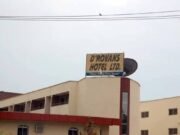KINGSLEY ALUMONA writes that Agbowo community, populated by off campus students of the university of Ibadan only becomes a beehive when students are in session but a shadow of itself when they are not, noting that members of the community are better off having them around.
There is a popular saying in Aba, the commercial hub of Abia State, that: If you bend down, you will see Aba. Agbowo, in Ibadan, on the other hand, is a different story. Agbowo and its environs are better seen from the apexes of two monumental landmarks in Ibadan — the Agbowo Shopping Complex skyscraper and the University of Ibadan Tower.
Agbowo is the most populated off-campus community around the University of Ibadan. Other communities around UI as popularly called include Samonda, Orogun, Ojoo, Bodija and Ajibode. The main road that leads to Agbowo is directly opposite UI main gate and with the cheap transportation to its nook and cranny, students prefer this community to others.
Life in Agbowo is a mixed world of interaction between students and non-students alike. The general consensus is that Agbowo is a ghetto. In fact students who behave in ways not expected of them are often taunted by lecturers with the saying: “You behave like people in Agbowo.”
However life in one part of Agbowo is in some instances markedly different from others. The structural architecture, the mud bricks and rusted roofs are ubiquitous. It is as if many of the houses in this community were built in the same year by the same builders. Generally, however, the houses are not in good conditions. Yet, their rents are not commensurate with their bad state.
“Basically, students and nonstudents pay the same amount as rent for a particular type of room or house. The price depends on what they want,” Hay Kins, an estate agent, said explaining that normal rooms in Agbowo range from N24,000 to N40,000.
Continuing he said: Reason for this is because it is a students’ environment. A room that is supposed to be N1,500 per month could go for between N2500 and N3000 and students are managing to pay.”
Every nook and cranny in Agbowo is linked. However, this linkage is a parody of order. Apart from the major roads like the one that connects Agbowo-UI to Agbowo-Express and the one that links Major Salawu Street and Quality Street all the way to Bodija, the other roads and streets need serious rehabilitation. Motorcycles and tricycles could hardly ply them. On some of these streets, especially the narrow ones, potholes and boulders frustrate even pedestrians. Some of these bad streets are mainly found in Abere and Ojokondo areas.
“We have been complaining about the bad roads to the community leaders,” Abidemi Kareem, the secretary of Tricycle Association of Nigeria, Agbowo branch, said. According to him, the water corporation workers made the matter worse when they excavated some sections of Orita-Agbowo Express road to lay some pipes, lamenting that “When rain falls, the river at Carpenter Junction makes it difficult for us to pass. The bad roads are spoiling our Tricycles.”
Lending his voice to the issue, Stephen George, a commercial motorcyclist said, “We fill the potholes by ourselves, but that does not last because the rains still wash them away. It is not easy. The bad roads affect us and our passengers.”
One of the major pejorative trademarks of Agbowo is its sanitary condition. Perhaps, this is why it is labelled a ghetto. In almost every gutter, brackish water could be seen flowing in every direction. The waste management system is dysfunctional. The company managing waste there only come to dispose them when there is an overflow and by which time some of the residents had begun to throw waste into drainages.
“Some houses do not have toilets. Many use pit toilets. Some people shit and throw it into the gutters, yet, the landlords collect huge amount of money for rent in such houses,” said Hay Kins
Precious Gerald is a UI student who lives around Kajola area. Though her hostel is relatively new and clean, the sewage leakage from the neighbouring houses makes life unbearable for its residents.
“Around my hostel, there are a lot of mosquitoes, scorpions, rats and cats because of the dirty water from toilets and overflowing waste drums,” she said describing the stench her neighbours are confronted with on a daily basis.
“Agbowo is a very dirty place, and it is the government that caused it,” D. O. Otakoya, who lives around Celestial Junction, told Sunday Tribune. According to him, there was a time that Agbowo used to be clean. Back then “the government kept drums at major streets for people to drop their waste. But after some time, the waste disposal companies stopped coming to pick them up. When the government drums were gone, people started throwing their waste in gutters and rivers. Diseases like chorea flourished,” he added.
Drainage system is another pressing concern in Agbowo. Apart from the little streams that meander through people’s backyards with weeds and waste in them, there is a major river that runs from Bodija to Agbowo all the way to UI and beyond. The Agbowo section of the river passes through Quality Street and Carpenter Junction. This river is a major dump site for sewage and household waste. When it rains heavily, it causes traffic jam.
Many of the houses that on the bank of this river are either deserted because of the unbearable odour associated with it or seriously dilapidated. In two one-storey buildings on Quality Street, leachate from the river has flooded their ground floors. Yet, in one of them, people still live in the upper floor.
“This river does not have a major name. The communities through which it passes call it different names,” Mr Tijani, a technician who builds and repairs popcorn machines, told Sunday Tribune. “We are used it,” he said resignedly, probably ignorant of the adverse effect of such heavily polluted river to his health.
Across the road from Mr Tijani, is Ganiyu Iyabo, whose relative sells bread, just three metres from the river. According to Tyabo, the waste in the river comes from Bodija market.
“The butchers and market women drop their waste in the river and it flows all the way to Agbowo. It disturbs us sometimes,” she said chuckling, explaining that it smells less when it rains and much during the dry seasons.
Of Crime And Cultism
Security is relatively okay in Agbowo; however, there have been many instances of burglary, theft and cult-related activities. Many times, when these vices occur, students are usually the victims. It is generally believed that non-students and Agbowo “area boys” are the perpetrators. The suspects believe it is the other way round.
Be that as it may, Agbowo is a good place for many people including landlords and operators of restaurants. While it is a fact that it is because of the students that even old buildings attract expensive rents, they are also the reason restaurants and bars flourish here. Taxi drivers and motorcyclist also go home smiling every day.
“Our major customers are students. We sell more and close late by 10 p.m. when students are around. When they are not around, we sell less and close by 9 p.m.,” Bidemi Lawal, a sales boy in ATS restaurant at Major Salawu Street, told Sunday Tribune.
Beatrice Udo, who sells food stuff close to Abere Mosque, and Adesoye Adebare, the secretary of Agbowo-Iwo Road route Taxi Drivers’ Association, also echoed Lawal’s view underscoring the importance of the presence of students in the community to their economic well-being.
“When students are around, especially in the morning when they are going to school and in the evening when they are returning, we make more money. But when they are on holidays or on strike, we make less money.”
The symbiotic relationship between students and Agbowo community is intertwined. It is so intertwined that one may take Agbowo out of students but it is almost impossible to take students out of Agbowo as long as the University of Ibadan continues to exist.
Culled from Sunday Tribune.


































